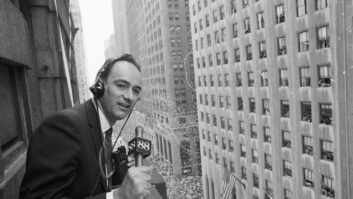If it happens, it will be a historic departure indeed. CBS is exploring options to get out of radio.
The company and brand have seen many corporate changes over nine decades but are associated with some of the most well-known names and call letters in the business: William S. Paley, Edward R. Murrow, Bing Crosby, Frank Stanton, Mel Karmazin, Infinity Broadcasting, Howard Stern, WIP, KDKA, KMOX, WFAN, too many to list.

A map showing the geographical distribution of CBS-owned radio stations from the company website.
Such a move has been speculated upon for years, and CBS has shed some of its radio assets over time; but CBS Chairman/Chief Executive Leslie Moonves got serious Tuesday, saying the company is exploring strategic options. He made the announcement during an investor day in New York.
The company is the second-largest U.S. radio chain as measured by revenue, and reaches an estimated 70 million listeners weekly. It has 117 stations in 26 markets. It has big stations in big markets with big familiar brands both legacy and new; the roots of its radio history run very deep.
CBS recently spun off its outdoor advertising business. “We’ll take our time as we did with outdoor, and we’ll make sure we do it right,” Moonves said.
Moonves said the evaluation process had just begun. “When we’re through we’ll have done something that’s right for CBS shareholders and for the radio business,” he said. Moonves recently replaced Sumner Redstone as chairman of CBS.
[See a list of CBS-owned radio stations.]
The Los Angeles Times, analyzing the announcement, mentioned trends that radio executives have been navigating for years: “The decision marks the end of an era and highlights the waning influence of commercial radio, which is no longer considered a growth industry,” the newspaper wrote. “Young adults spend more time listening to digital music files, podcasts and subscription Internet radio services such as Spotify and Pandora. The shift has prompted major advertisers, including car dealerships, wireless phone companies and financial services firms, to steer more of their marketing dollars to digital platforms.”
The Columbia Broadcasting System has its roots in the late 1920s when a talent agent, Arthur Judson, established his own network to help benefit his clients, according to a history published by Encyclopedia Britannica. United Independent Broadcasters soon merged with the Columbia Phonograph and Records Co. That operation was bought by William S. Paley and signed on in 1929 as the Columbia Broadcasting System.











